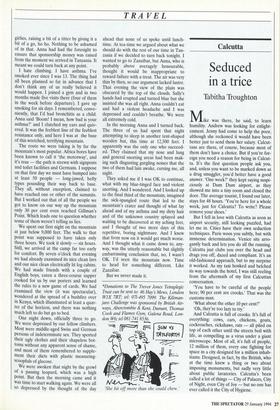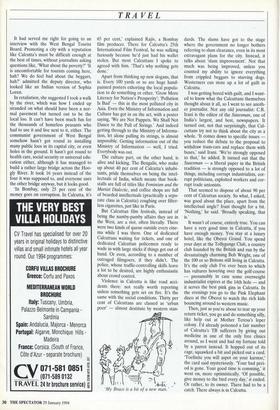Calcutta
Seduced in a trice
Tahitha Troughton
Mike was there, he said, to learn humility. Andrew was looking for enlight- enment. Jenny had come to help the poor, although she reckoned it would have been better just to send them her salary. Calcut- tans are there, of course, because most of them don't have a choice. But if you're for- eign you need a reason for being in Calcut- ta. It's the first question people ask you, and, unless you want to be marked down as a drug smuggler, you'd better have a good answer. 'One week?' they kept saying suspi- ciously at Dum Dum airport, as they showed me into a tiny room and closed the door. The average tourist, I found out later, stays for 48 hours. 'You're here for a whole week, just for Calcutta? To write? Please remove your shoes.'
But I fell in love with Calcutta as soon as airport security, still looking puzzled, had let me in. Cities have their own seduction techniques. Paris woos you subtly, but with immense determination. Venice sits arro- gantly back and lets you do all the running. Calcutta just clubs you over the head and drags you off, dazed and compliant. It's an old-fashioned approach, but to my surprise it worked. As my taxi honked and belched its way towards the hotel, I was still reeling from the aftermath of my first Calcuttan conversation.
'You have to be careful of the people here; 90 per cent are crooks.' That was the customs man.
'What about the other 10 per cent?'
'Oh, they're too lazy to try.'
And Calcutta is full of crooks. It's full of everything: cows, cars, chickens, goats, cockroaches, rickshaws, rats — all piled on top of each other until the streets boil with life, as compelling as a virus under a giant microscope. Most of all, it's full of people, 12 million of them, every one fighting for space in a city designed for a million inhab- itants. Designed, in fact, by the British, who at the time knew a thing or two about imposing monuments, but sadly very little about public lavatories. Calcutta's been called a lot of things — City of Palaces, City of Night, even City of Joy — but no one has ever called it the City of Hygiene.
TRAVEL
It had served me right for going to an interview with the West Bengal Tourist Board. Promoting a city with a reputation like Calcutta's must be difficult enough at the best of times, without journalists asking questions like, 'What about the poverty?"It is uncomfortable for tourists coming here, hah? We do feel bad about the beggars, hah?' admitted the deputy director, who looked like an Indian version of Sophia Loren.
In retaliation, she suggested I took a walk by the river, which was how I ended up stranded on what should have been a nor- mal pavement but turned out to be the local loo. It can't have been much fun for the thousands of homeless peasants who had to use it and live next to it, either. The communist government of West Bengal somehow hasn't got round to installing many public loos in its capital city, or even holes in the ground. It hasn't got round to health care, social security or universal edu- cation either, although it has managed to build a rather large bridge across the Hoo- gly River. It took 16 years instead of the four it was supposed to, and everyone uses the other bridge anyway, but it looks good.
'In Bombay, only 25 per cent of the money goes on corruption. In Calcutta, it's 65 per cent,' explained Rajiv, a Bombay film producer. There for Calcutta's 25th International Film Festival, he was sulking furiously because he'd just had his wallet stolen. But most Calcuttans I spoke to agreed with him. 'That's why nothing gets done.'
Apart from thinking up new slogans, that is. Every 100 yards or so are huge hand- painted posters exhorting the local popula- tion to do something or other. 'Grow More Literacy for Nation's Prosperity'; 'Pollution Is Bad' — this in the most polluted city in Asia. Even the Ministry of Information and Culture has got in on the act, with a poster saying, 'We are Not Puppets. We Shall Not Dance to the Pull of Strings.' And indeed getting through to the Ministry of Informa- tion, let alone pulling its strings, is almost impossible. Getting information out of the Ministry of Information — well, I tried. Everybody was out.
The culture part, on the other hand, is alive and kicking. The Bengalis, who make up about 40 per cent of Calcutta's inhabi- tants, pride themselves on being the intel- lectuals of India, which means that book- stalls are full of titles like Feminism and the Marxist Dialectic, and coffee shops are full of bearded intellectuals (practically a sepa- rate class in Calcutta) coughing over filter- less cigarettes, just like in Paris.
But Calcuttan film festivals, instead of being the namby-pamby affairs they are in the West, are a riot, often literally. There were two kinds of queue outside every cine- ma while I was there. One of dedicated Calcuttans waiting for tickets, and one of dedicated Calcuttan policemen ready to wade in with large sticks if things got out of hand. Or even, according to a number of outraged filmgoers, if they didn't. The police, whose traffic-controlling skills leave a lot to be desired, are highly enthusiastic about crowd control.
Violence in Calcutta is like road acci- dents there: not really worth reporting unless something gets set on fire. It's the same with the social conditions. Thirty per cent of Calcuttans are classed as 'urban poor' — almost destitute by western sten-
'My Bruce is a bit of a new man.' -
dards. The slums have got to the stage where the government no longer bothers referring to slum clearance, even in its most extravagant plans for the city. Instead, it talks about 'slum improvement'. Not that much was being improved, unless you counted my ability to ignore everything from crippled beggars to starving dogs. Westerners can store up a lot of guilt in Calcutta.
I was getting bored with guilt, and I want- ed to know what the Calcuttans themselves thought about it all, so I went to see anoth-
er journalist. Not any old journalist: C.R. Irani is the editor of the Statesman, one of
India's largest, and best, newspapers. It
turned out, not that surprisingly, that Cal- cuttans try not to think about the city as a
whole. 'It comes down to specific issues - you reduce the debate to the proposal to withdraw tram-cars and replace them with buses,' said Irani. 'We're strongly opposed
to that,' he added. It turned out that the Statesman — a liberal paper in the British tradition — is strongly opposed to a lot of things, including corrupt industrialists, cor- rupt politicians, exploited workers and cor- rupt trade unionists.
That seemed to dispose of about 90 per cent of Calcuttan society. So what, I asked, was good about the place, apart from the intellectual angle? Irani thought for a bit. 'Nothing,' he said. 'Broadly speaking, that is.'
It wasn't of course, entirely true. You can have a very good time in Calcutta, if you have enough money. You stay at a luxury hotel, like the Oberoi Grand. You spend your days at the Tollygunge Club, a country club founded by the British and run by the devastatingly charming Bob Wright, one of the 100 or so Britons still living in Calcutta.
It's the only club I've ever been to which
has vultures hovering over the golf-course — presumably in case some overweight
industrialist expires at the 14th hole — and it serves the best pink gins in Calcutta. In the evenings you go to the Pink Elephant disco at the Oberoi to watch the rich kids bouncing around to western music.
Then, just as you're about to tear up your return ticket, you go and do something silly, like help out at Mother Teresa's leper colony. I'd already poisoned a fair number of Calcutta's TB sufferers by giving out medicine in one of the only free clinics
around, so I went and had my fortune told by a parrot instead. It hopped out of its
cage, squawked a bit and picked out a card.
'Toefinite you will aspot on your karmar,' the card said mysteriously. 'Your bad peri- od is gone. Your good time is comming,' it went on, more optimistically. 'Of possible, give money to the bird every day,' it ended. Or rather, to its owner. There had to be a catch. There always is in Calcutta.



































































 Previous page
Previous page